
At Teachers on Call, many of the in-home and online tutoring requests we receive for elementary students focus on reading and writing, foundational skills that families are eager to strengthen from the early grades onward. While parents and teachers often recognize the power of graphic novels in supporting reluctant readers, these books also serve as valuable enrichment tools for strong readers looking to stretch their thinking. Despite the common misconception that graphic novels are primarily for struggling readers, they benefit students of all reading abilities—including those with advanced intellectual ability who identify as gifted—by building visual literacy, critical thinking, and deep comprehension. That’s why we consider Canadian bestselling middle-grade graphic novelist Johnnie Christmas an expert on the topic. Keep reading for an exclusive interview with him about his creative process, the inspiration behind his work, and his advice on how to elevate young readers and inspire their passion for stories and writing.
At Teachers on Call, our in-home and online English tutors are firm believers in encouraging students to read material that genuinely interests them during their free time—the key is simply to get them reading. Graphic novels are a powerful tool in this effort, engaging reluctant readers through accessible visuals and clear story flow, while also challenging strong readers to sharpen their skills, deepen comprehension, and pay closer attention to detail. Teachers on Call’s President & CEO, Joanne Sallay, was fortunate to meet bestselling author-illustrator Johnnie Christmas in downtown Toronto during the Forest of Reading Festival and attend one of his student reading and writing workshops. Fascinated by his insights—and inspired by the potential of graphic novels as an enrichment tool—she was motivated to explore this topic further through the interview that follows.
What’s the difference between comic books and graphic novels?
You may be wondering about the difference between comic books and graphic novels. Although they may look similar at first glance, comic books and graphic novels are not the same. Comic books typically come in shorter, individual issues that tell parts of a larger story. Graphic novels, on the other hand, present a complete narrative from beginning to end, with developed characters, deeper plots, and more sustained reading—making them especially effective for literacy skill-building across all reading levels.
Why Gamerville Belongs in your Home and Classroom Library
Parents and educators alike will find Gamerville a powerful addition to any home or classroom library. The story touches on timely themes such as screen time, social interaction, and the challenges young people face when stepping out of their comfort zones. It offers a great opportunity for conversations about digital wellness and real-world friendships. The in-person and online tutoring team at Teachers on Call recommends this book for its ability to resonate with readers of all abilities. Special education is a broad category—one that includes students with learning challenges as well as those who identify as gifted—and many of these students have shared how much they love Gamerville. With its engaging visuals and relatable characters, Gamerville captivates middle-grade readers and helps them discover the joy of storytelling and the power of self-discovery through books.

A Graphic Novel That Speaks to Kids Growing Up in a Digital World
In today’s digital world, it can be tough for kids to unplug and connect with the people and world around them. That’s why stories that explore friendship, teamwork, and finding balance feel especially meaningful. When Max Lightning finally qualifies for Gamerville, the ultimate video game championship, he’s ready to prove himself as the top player in Lone Wolf of Calamity Bay. But when his parents send him to Camp Reset, a place where electronics are forbidden and outdoor activities rule, his gaming dreams come to a screeching halt. In Gamerville (published by HarperAlley), award-winning author and illustrator Johnnie Christmas explores themes of connection, friendship, and finding balance in a digital world. Nominated for the 2025 Silver Birch Fiction Award® (Grades 5–6 fiction), this graphic novel delivers a story that resonates with today’s tech-savvy readers while offering timeless lessons about teamwork and growth. Keep reading for our exclusive interview with Johnnie Christmas about his creative process, his inspiration, and what it means to have Gamerville recognized by the Forest of Reading program.
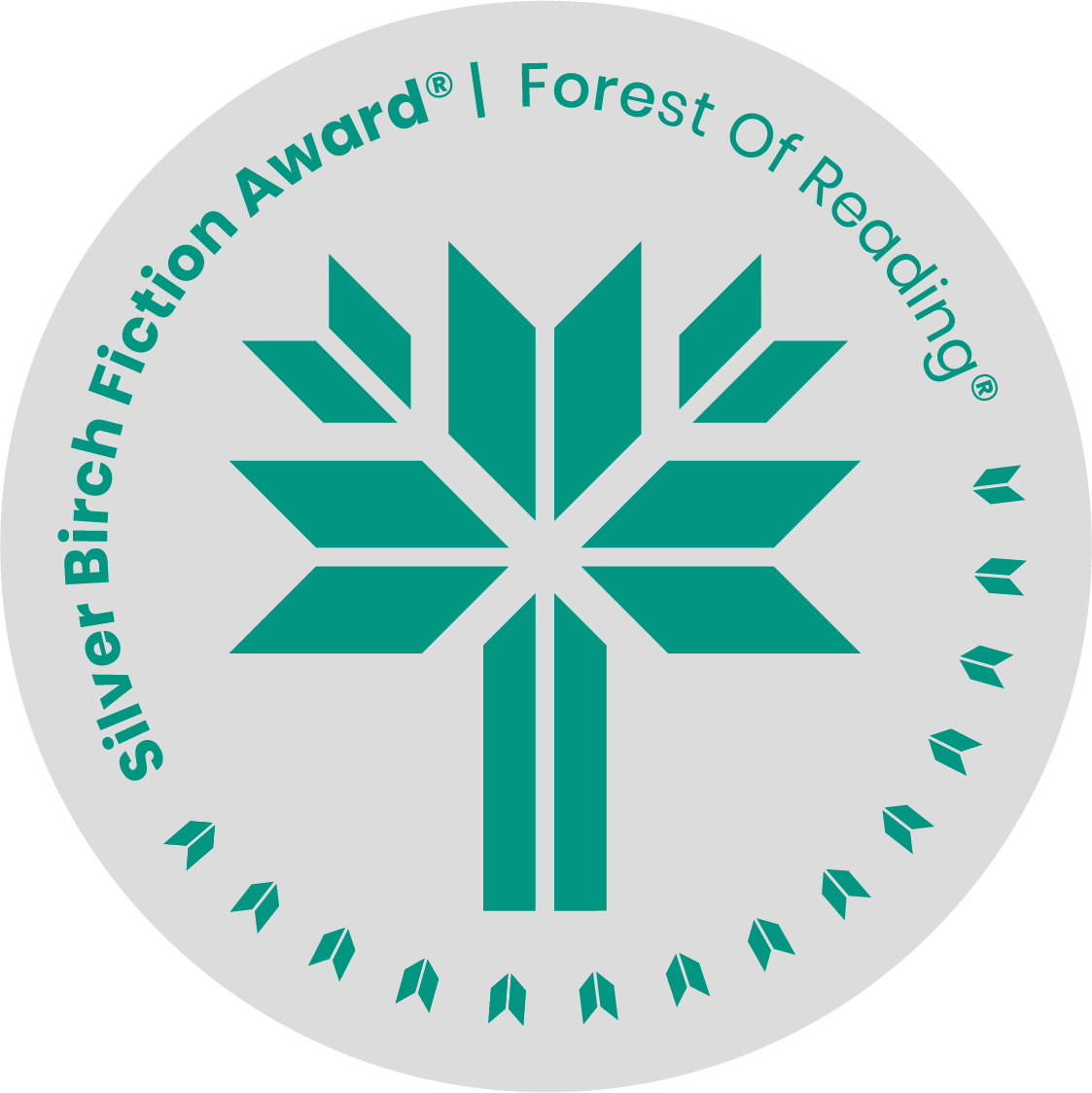
Why the Forest of Reading Inspires Canada’s Young Readers
Gamerville was previously nominated for the 2025 Silver Birch Fiction Award at the Forest of Reading. The Forest of Reading is a cornerstone of literacy in Canada, bringing communities together around a shared love of books. Run by the Ontario Library Association, this nationwide program celebrates Canadian authors and illustrators through ten award categories in English and French. What sets it apart is its participatory spirit—students across Canada read the nominated books and vote for their favourites, giving young readers an authentic voice in the process. Each spring, the excitement culminates in the Forest of Reading Festival at Toronto’s Harbourfront Centre (235 Queens Quay West, Toronto, ON M5J 2G8). The festival is a joyful gathering of authors, educators, and thousands of students celebrating literacy and creativity. At Teachers on Call, we’re proud to champion initiatives like this that nurture lifelong readers and empower students to see their choices and opinions matter in the literary world.
About the Author: Johnnie Christmas
Johnnie Christmas is a #1 New York Times bestselling graphic novelist and the author of Gamerville. His acclaimed middle-grade debut Swim Team earned a Coretta Scott King Award Illustrator Honour and numerous literary prizes. Johnnie has also collaborated with Margaret Atwood on Angel Catbird and adapted William Gibson’s Alien 3 screenplay into a celebrated graphic novel. Johnnie lives and creates in Vancouver, British Columbia, where the city’s natural beauty and creative energy continue to inspire his work.
Read Our Exclusive Interview with Gamerville Author Johnnie Christmas
Many educators and parents recognize the power of graphic novels in helping reluctant readers—but they’re also a fantastic tool for enrichment. Can you speak to the role graphic novels play not just in remediation, but in elevating strong readers as well?
Graphic novels are an important tool for building strong readers and building literacy through strong readers are the foundation of our society. It is vitally important. Not to mention the simple joy of reading.
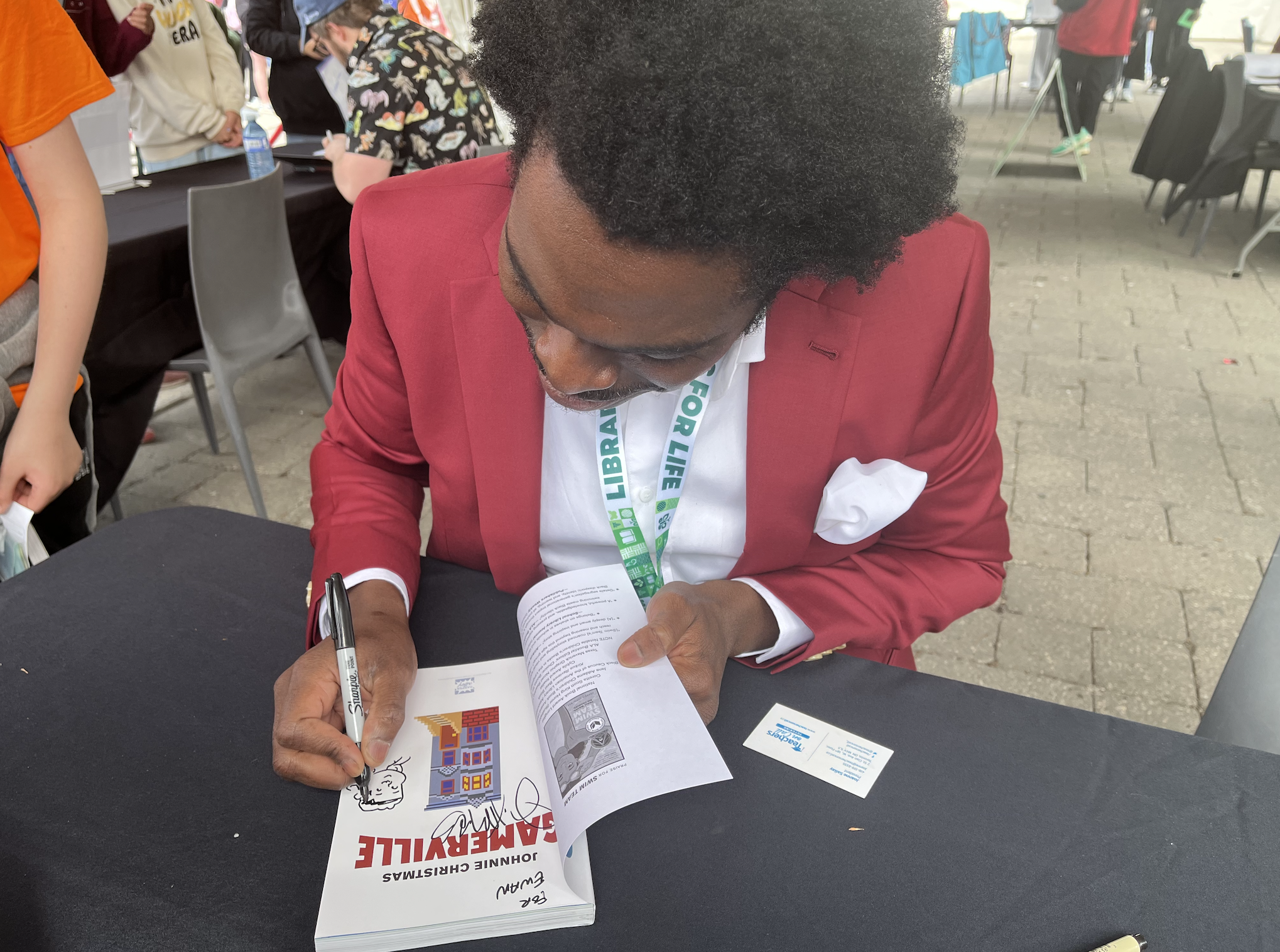
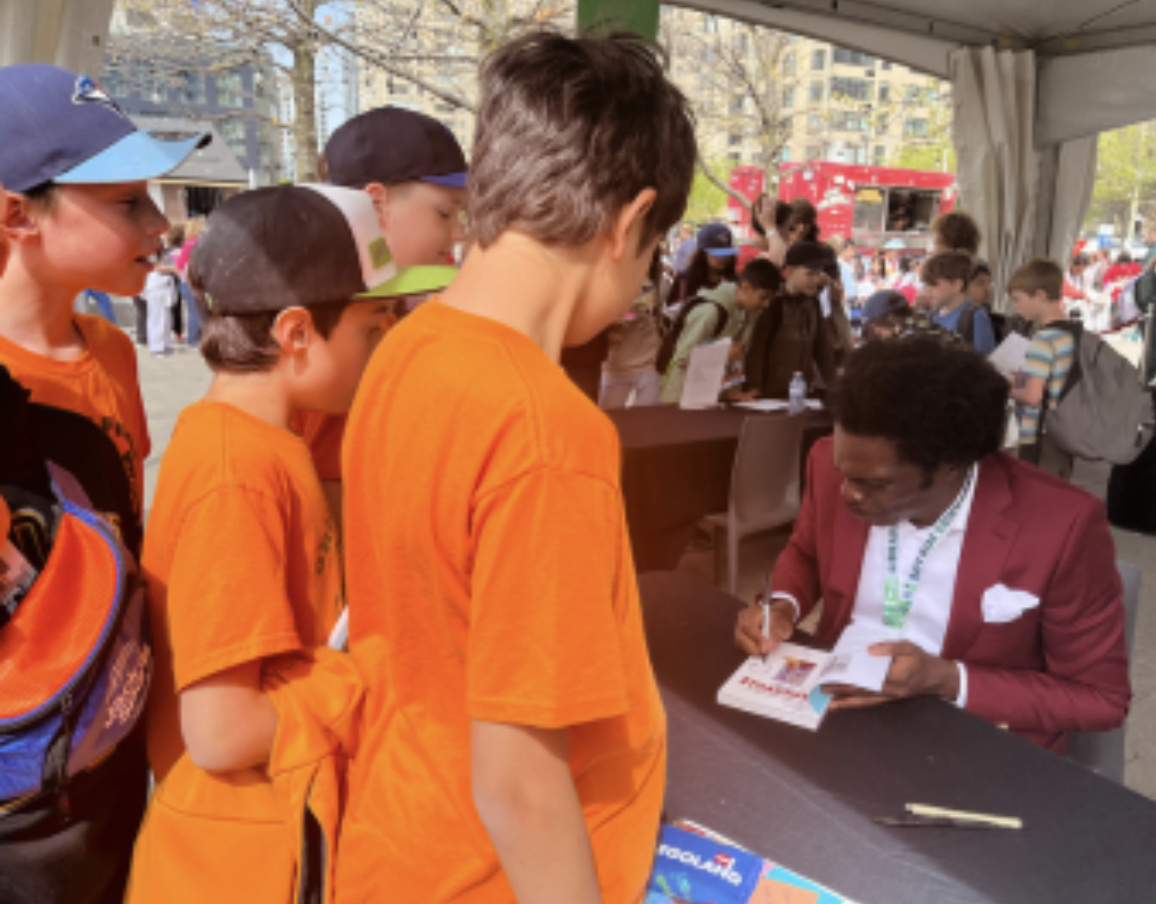
Your work has inspired countless young readers to fall in love with books. What is it about the graphic novel format that makes it such a powerful gateway into reading
Graphic novels are a powerful gateway to reading because of their unique ability to combine the visual with the written word, in a way that strengthens the work. For example, you could see what’s being discussed as well as how the words describing it are spelled, which are great for comprehension, while also conveying a powerful story.
Being a mythology lover as a kid, seeing the similarities between superhero comics and Greek mythology bolstered my love of reading, deepened my love of stories, helped my spelling and encouraged my love of visual art. It all came together in this very attractive package of graphic novels.
Kids are naturally drawn to images—as are more people. This form of sequential visual storytelling draws readers in, in a way other forms of reading can’t.
You’ve led workshops and school visits across the country. What are some of the most memorable or surprising things you've learned from students during these sessions?
Kids are very close readers. They pay attention to the visual language and information, as well as the written information. At school visits, library visits, workshops, or in letters, I’m always surprised by their questions, the things they notice in the work. Some things I hadn’t seen myself. Once the work goes into the public, it no longer just belongs only to me. It belongs to both of us: your interpretation as a reader is just as valid as my intention as the creator.
As an author-illustrator, what advice would you give to young readers who dream of creating their own graphic novels someday?

My advice to young, or even the older readers, I’ll say future creators, is this: start as soon as possible, and make as much as possible. Your first works are not going to be perfect. In fact the first things you create will be more lessons than works of art. Because you’ll realize how far the gap is between your vision and your ability to realize that vision. It’s a sobering experience. But next time you try, you’ll notice that gap has closed a little bit, and it will keep closing if you keep making work. You may not always make exactly what you intended, but soon you’ll make something interesting.
But that requires iteration: make, make, and make again, until you ultimately find work that’s truly your own. It’s deeply satisfying when you start creating work only you could have made.
You live in Vancouver—a city full of natural beauty and creative energy. Are there any specific places in or around Vancouver where you go to spark inspiration or recharge creatively?
I walk around my neighbourhood. Usually the neighbourhoods of East Vancouver, without headphones. Or on the sea wall. I find letting my mind wander, without distraction, is the best thing for creativity.
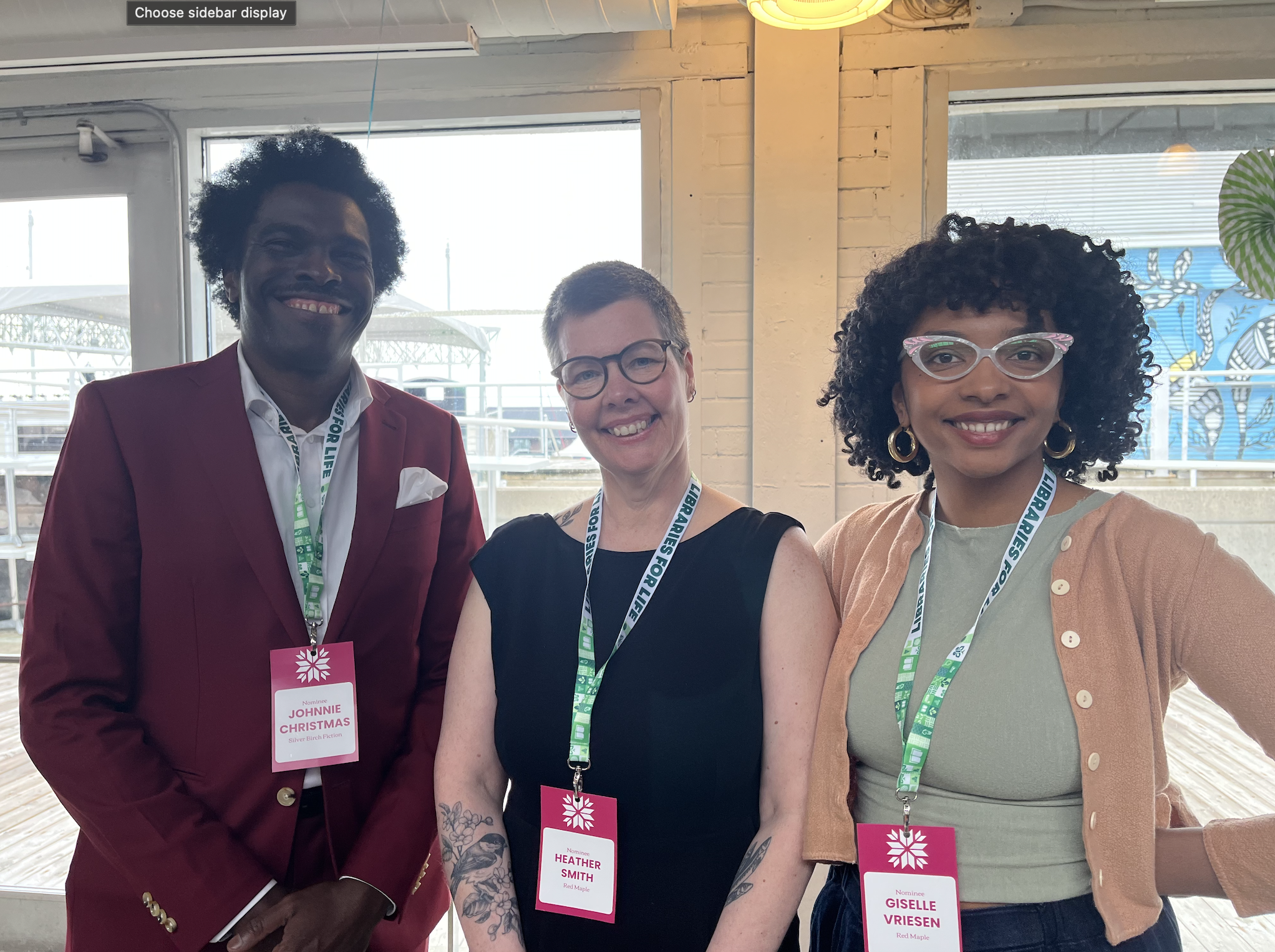
Gamerville was previously nominated for the 2025 Silver Birch Fiction Award at the Forest of Reading, Canada’s largest recreational reading program. What did that recognition mean to you, especially knowing that the program is student-driven?
Gamerville being recognized by the Forest of Reading program was truly amazing. It means a lot to me to have that kind of recognition here in Canada. The reception for the book was incredible as was the actual Forest of Reading ceremony. Being on stage with all those kids cheering on books they loved and championed, surrounded by readers, librarians, fellow authors, organizers, and volunteers. It was such an incredible experience.
Many of your books tackle big themes—identity, friendship, family, ambition—but always in a way that’s approachable for young readers. What inspires the stories you choose to tell?
What’s interesting is that I never think about themes when I begin a project. I always start with something very simple. With Swim Team, I almost drowned as a kid. So I asked myself: "what would happen if things had gone slightly differently? What if my fear of swimming hadn’t stopped me from joining a school swim team?" Those questions—many of them the same questions Bree asks in the book—guided the story.
With Gamerville, I knew it would be about connectivity and gaming. I had a rough plot: Max would be at camp, he would want to be at Gamerville, and he would need to escape camp to get to the convention. That’s what I knew—some kind of internet connectivity and human connectivity would be part of it. But as the characters started communicating, as they pursued their dreams and acted in their own best interests, I began to discover what the book was really about. I realized that human connection and friendship come up a lot in my books. Clearly, these are things I think about often—and I’m glad I do. But I never start with the theme. I usually start with a character, a plot, or a juicy idea. From there, I let it expand. Once I get to know my characters, they tell me what they’re interested in. That’s the most fun part, and it feels the most authentic.
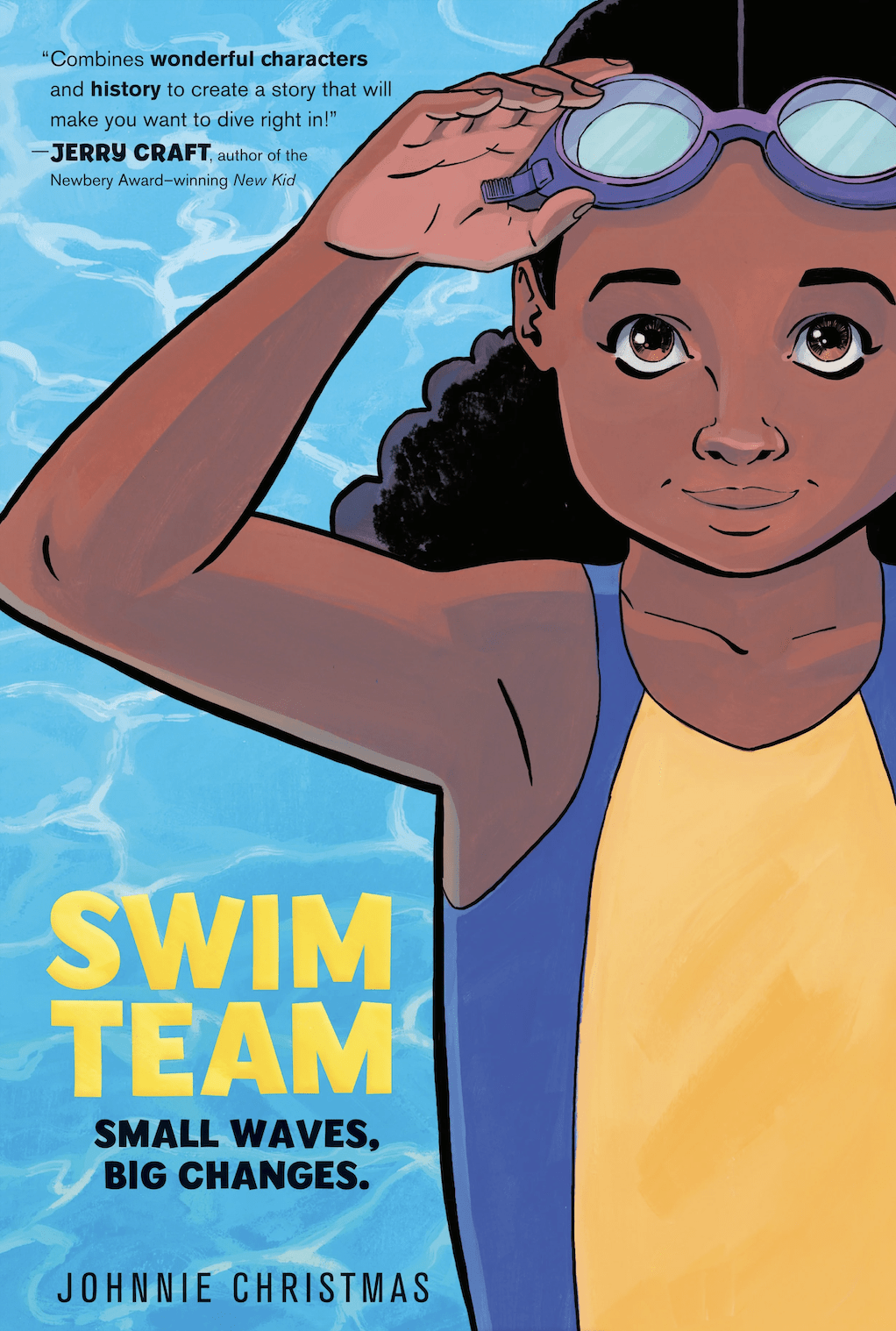
How have your personal experiences and background shaped the kinds of stories you tell and the characters you create?
My personal experiences have shaped my books in many ways. Swim Team came directly from my near-drowning as a child. The first time I encountered a swimming pool, I was already five years old, and I didn’t know how to swim. I ended up at the bottom of that pool. That experience shaped Swim Team in a deeply personal way. The book became a mission for me. It was important that everyone in my orbit understood that too, why it mattered to me.
With Gamerville, the seed came from my love of video games as a kid. Eventually, I had to stop because I would get motion sick. But the desire to keep playing was strong, I could feel the pull of it. That tension gave me insight into Max’s motivation. If Max felt that same draw, and the convention was within reach—just beyond camp—what would he do? The seed of my experience grew into the tree of that story. The emotional truths, fear of drowning, love of games, powered both books.
Looking back on your own childhood, what books made you fall in love with reading?
Many books made me fall in love with reading. I loved The NeverEnding Story by Michael Ende. I loved the works of Shel Silverstein. I loved The Berenstain Bears, Where the Wild Things Are by Maurice Sendak, and really any of Sendak’s art I could get my hands on. I loved Greek mythology, collections of stories in omnibuses, encyclopedias, wherever I could find them. Those tied directly into my love of superhero comics. I can’t say which came first, comics or mythology, but together they fueled me.
I read Peanuts and Archie comics, then later Calvin and Hobbes and Curtis. Those were the things that made me fall in love with reading. Graphic novels, comic books, and newspaper strips
~
Johnnie Christmas reminds us that storytelling can be both fun and transformative. Through Gamerville, he captures the world of gaming and connection in a way that feels authentic to kids growing up in today’s tech-driven world. His message that creativity, curiosity, and human connection are vital parts of the journey resonates deeply with readers of all ages. Whether your child is an avid gamer or a budding bookworm, Gamerville is a reminder that sometimes stepping away from the screen can help us discover the stories waiting within ourselves. Stay tuned for more exciting Hooked on Books features as we continue celebrating literacy and dive into the Forest of Reading 2026 nominees in the months ahead.
Related Articles View All
Celebrate Winter Together: A Family Guide to Barrie Winterfest
Barrie Winterfest returns February 7 and 8, 2026, bringing families together for a weekend of outdoor fun, live entertainment, ice sculptures, and hands-on winter activities along Barrie’s scenic waterfront. From creative learning opportunities to exciting performances and community celebrations, discover why Winterfest continues to be one of Central Ontario’s most beloved winter traditions.
From LEGO to Electric Vehicles: What Families and Students Can Learn at the Canadian International AutoShow
Explore how the 2026 Canadian International AutoShow brings learning to life for students and families through LEGO, Hot Wheels, electric vehicles, and hands-on STEM experiences.
How Angela Ahn’s “Julia on the Go!” Series Helps Kids Navigate Change
Julia on the Go! The Big Splash by Vancouver author Angela Ahn is a warm, engaging chapter book that helps young readers navigate change, teamwork and perseverance. As Julia and her swim team face a new coach and unexpected challenges, the story explores resilience, empathy and the power of community.

